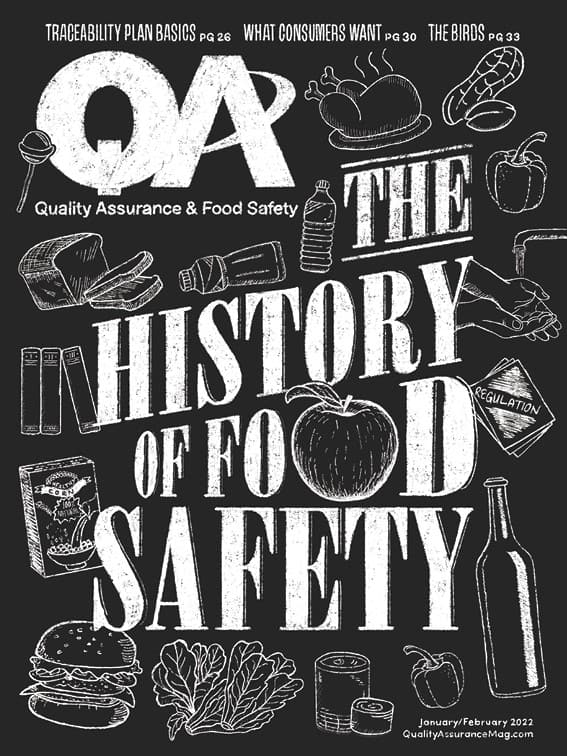
Jill Stuber grew up on a farm in Wisconsin. So, perhaps naturally, she went to school at the University of Wisconsin thinking she was going to be a dairy nutritionist.
“I’ve always been around agriculture, cheese, you name it,” she said. “I thought I’d be working with cows.”
But in her junior year, Stuber took food science as an elective and fell in love.
“Organic chemistry and stuff like that made no sense, but as soon as we started talking about why bread browns [when you toast it] and here’s the enzymatic reaction, I was like, ‘That all makes sense now!’ ”
These types of moments cemented her interest in a career path in food science. Along the way, she’s worked as a scientist at Land O’ Lakes, lab manager and quality systems manager at Gold’n Plump Co. and technical sales manager at Merieux NutriSciences, among other stops.
After a career of working for larger companies, she struck out on her own in October 2019, founding the Food Safety Coach, where she helps coach food safety and quality assurance professionals to make a difference at their companies by becoming better leaders and more. She’s also co-founder of Catalyst, a company that aims to provide a roadmap for food manufacturers and retail organizations to build sustainable food safety culture.
We caught up with Stuber, who recently started a weekly LinkedIn video series with fellow Catalyst co-founder Tia Glaive, to talk about food safety culture, coaching, success and what it means to be a nerd for food safety.
You have to be willing to see different perspectives [to be successful in this industry].
A quote I saw recently was, “Experts see few possibilities, beginners see many.” It stuck with me because as you go down this path of learning more, getting more certifications — all this stuff — you get tunnel vision and say, “Here’s what we have to do,” versus asking, “What can we do?”
Quality, to me, means fit for use. I know it’s a pretty standard definition, but because everybody’s definition of quality is different, it has to just fit what I’m using it for.
Food safety is the unspoken expectation. The meaning to me has changed since I’ve been working. Earlier, I would have said that it means we’re meeting pathogen results or microbe results or we’re handwashing and doing sanitation and all that good stuff.
Now, I kind of look at it more from the consumer standpoint — that it’s just unspoken. I shouldn’t have to ask for safe food, and neither should consumers.
The part that gets interesting about it is that behind both food safety and quality, they’re working off the same foundational programs.
Some people even argue that food safety is actually just a subset of quality. It’s just that the tolerance on it is none.
Not too many people get excited to talk about GFSI or SQF elements or of the multiple ways that handwashing can be done wrong. But that’s kind of fun to talk about because if you don’t, you feel like it’s only you. But instead, really, everybody has experienced this.
Back when I started at Gold’n Plump, I had people who had been there for years, and I was new out of grad school. They were like, “Salmonella dies in the chiller!” I replied, “What? Who told you this garbage?”
I told them, “No. Those little bugs get in the chiller, and they whip on their winter coats. But as soon as they come out, they say, ‘Let’s start back up.’ ”
People would say, “You are such a nerd.” “Yeah, but you understood what I was talking about.”
For many years, there was this missing piece — why are we struggling to have these fantastic food safety programs or procedures connect with people to make them want to do it this way or to help them engage with it? Food safety culture fills that gap. It recognizes that food safety is about people.
One of the things that I love about the food safety culture campaign is that hopefully it’s inspiring people in food safety and quality to kind of get outside the box. We don’t have to be just science and data. We do work with people. We need to take that next step.

Explore the January February 2022 Issue
Check out more from this issue and find your next story to read.
Latest from Quality Assurance & Food Safety
- Scentian Bio Wins Top Prize at IFT FIRST Startup Pitch Competition
- Evigence Debuts FreshSense to Change How Food Industry Measures Freshness
- Acme Releases Automated Scraper Strainer
- Mitzi Baum to Step Down as CEO of Stop Foodborne Illness
- USDA ARS Scientists Develop Pectin That Gels with Low-Sugar Products
- GS1 US Celebrates 50-Year Barcode 'Scanniversary' and Heralds Next-Generation Barcode to Support Modern Commerce
- New Florida Extension Agent Will Teach Stakeholders About Food Safety
- Athletic Brewing Company Announces $50 Million Equity Financing Round Led by General Atlantic





